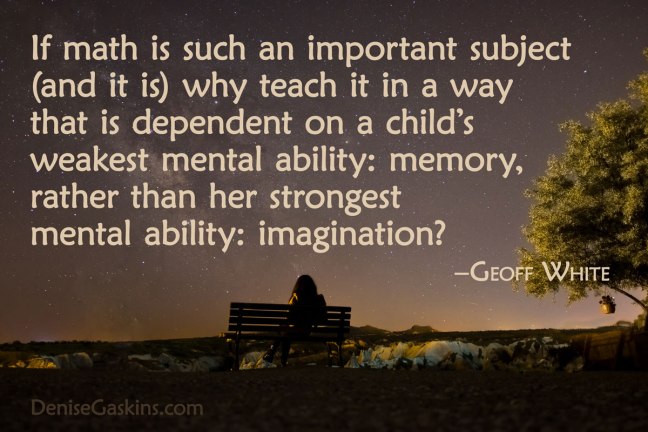“Teach mathematics the way we learn any other subject: Make it visual, make it concrete, not dependent on meaningless, abstract symbols, employ all the senses!
…
If math is such an important subject (and it is) why teach it in a way that is dependent on a child’s weakest mental ability: memory, rather than her strongest mental ability: imagination?”— Geoff White
The Grade 10 Math Crunch, or Hitting the Wall at Grade 10
Mathematics and Imagination
How can we stir up our students’ imagination?
Teachers have struggled with this question for years — perhaps since the beginning of the profession.
Consider these comments by W. W. Sawyer in Mathematician’s Delight:
“Earlier we considered the argument, ‘Twice two must be four, because we cannot imagine it otherwise.’ This argument brings out clearly the connexion between reason and imagination: reason is in fact neither more nor less than an experiment carried out in the imagination.
“People often make mistakes when they reason about things they have never seen. Imagination does not always give us the correct answer. We can only argue correctly about things of which we have experience or which are reasonably like the things we know well. If our reasoning leads us to an untrue conclusion, we must revise the picture in our minds, and learn to imagine things as they are.
“When we find ourselves unable to reason (as one often does when presented with, say, a problem in algebra) it is because our imagination is not touched. One can begin to reason only when a clear picture has been formed in the imagination.
“Bad teaching is teaching which presents an endless procession of meaningless signs, words and rules, and fails to arouse the imagination.”
CREDITS: Background photo by Mehmet Kürşat Değer on Unsplash.

Albert Einstein’s famous quote on the subject: “Imagination is more important than knowledge. For knowledge is limited to all we now know and understand, while imagination embraces the entire world, and all there ever will be to know and understand.”
Concrete, visual, spatial learning in the context of a tabletop game or other manipulative is a great way for kids to learn math in a way that they can understand easily.